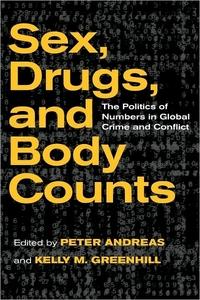

Purchase
The Politics of Numbers in Global Crime and Conflict
Cornell Univ Pr
May 2010
On Sale: May 14, 2010
287 pages
ISBN: 0801476186
EAN: 9780801476181
Paperback
Add to Wish List
Non-Fiction
"At least 200,000-250,000 people died in the war in Bosnia." "There are three million child soldiers in Africa." "More than 650,000 civilians have been killed as a result of
the U.S. occupation of Iraq." "Between 600,000 and 800,000 women are trafficked across
borders every year." "Money laundering represents as much as 10 percent of global
GDP." "Internet child porn is a $20 billion-a-year industry." These are big, attention-grabbing numbers, frequently used
in policy debates and media reporting. Peter Andreas and
Kelly M. Greenhill see only one problem: these numbers are
probably false. Their continued use and abuse reflect a much
larger and troubling pattern: policymakers and the media
naively or deliberately accept highly politicized and
questionable statistical claims about activities that are
extremely difficult to measure. As a result, we too often become trapped by these mythical
numbers, with perverse and counterproductive consequences.
This problem exists in myriad policy realms. But it is
particularly pronounced in statistics related to the
politically charged realms of global crime and
conflict-numbers of people killed in massacres and during
genocides, the size of refugee flows, the magnitude of the
illicit global trade in drugs and human beings, and so on. In Sex, Drugs, and Body Counts, political scientists,
anthropologists, sociologists, and policy analysts
critically examine the murky origins of some of these
statistics and trace their remarkable proliferation. They
also assess the standard metrics used to evaluate policy
effectiveness in combating problems such as terrorist
financing, sex trafficking, and the drug trade.
Comments
No comments posted.
Registered users may leave comments.
Log in or register now!
| 


 © 2003-2025 off-the-edge.net
all rights reserved Privacy Policy
© 2003-2025 off-the-edge.net
all rights reserved Privacy Policy